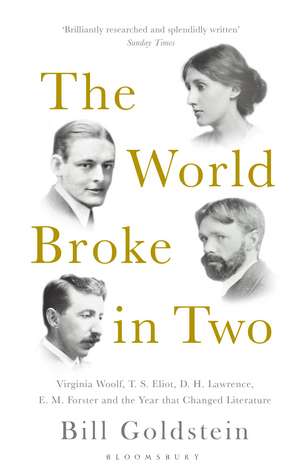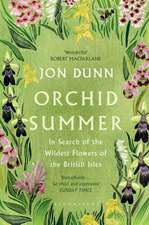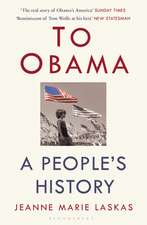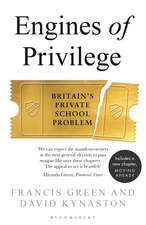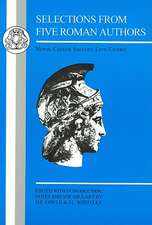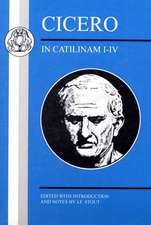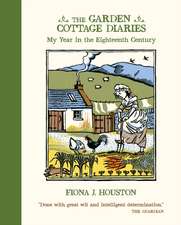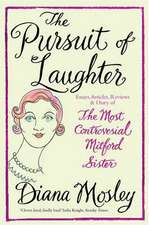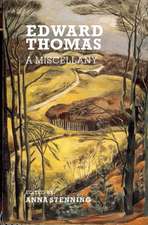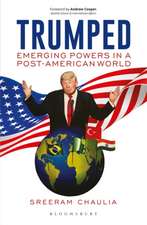The World Broke in Two: Virginia Woolf, T. S. Eliot, D. H. Lawrence, E. M. Forster and the Year that Changed Literature
Autor Bill Goldsteinen Limba Engleză Paperback – 19 sep 2018
| Toate formatele și edițiile | Preț | Express |
|---|---|---|
| Paperback (2) | 63.25 lei 3-5 săpt. | |
| Bloomsbury Publishing – 19 sep 2018 | 63.25 lei 3-5 săpt. | |
| St. Martins Press-3pl – 7 aug 2018 | 103.67 lei 3-5 săpt. |
Preț: 63.25 lei
Preț vechi: 82.77 lei
-24% Nou
Puncte Express: 95
Preț estimativ în valută:
12.10€ • 12.64$ • 10.02£
12.10€ • 12.64$ • 10.02£
Carte disponibilă
Livrare economică 14-28 martie
Preluare comenzi: 021 569.72.76
Specificații
ISBN-13: 9781408894552
ISBN-10: 1408894556
Pagini: 376
Dimensiuni: 129 x 198 x 26 mm
Greutate: 0.3 kg
Editura: Bloomsbury Publishing
Colecția Bloomsbury Publishing
Locul publicării:London, United Kingdom
ISBN-10: 1408894556
Pagini: 376
Dimensiuni: 129 x 198 x 26 mm
Greutate: 0.3 kg
Editura: Bloomsbury Publishing
Colecția Bloomsbury Publishing
Locul publicării:London, United Kingdom
Caracteristici
The first group biography of these four writers, it will appeal to readers of Concerning E. M. Forster by Frank Kermode, Virginia Woolf by Hermione Lee, The Letters of T. S. Eliot and Frances Spalding's The Bloomsbury Group
Notă biografică
Bill Goldstein is the founding editor of the The New York Times books website and the book critic for the weekend edition of WNBC's Today in New York. He is also curator of public programs at Roosevelt House, the public policy institute of New York's Hunter College. A graduate of the University of Chicago, he received a PhD in English from City University of New York Graduate Center in 2010, and is the recipient of writing fellowships at MacDowell, Yaddo, Ucross and elsewhere. He lives in New York.
Recenzii
This is a brilliant book about the birth of modernism, one that taught me something on every page ... You will feel - and be! - much smarter after you read it
A fascinating and engrossing tale ... Goldstein creates an original, moving and at times wryly amusing account of four literary demi-gods during the course of these few months that shaped a new direction in English literature, incorporating a wealth of detail which builds, layer upon layer, until the picture is satisfyingly complete
A splendidly written chronicle of 1922 and the birth of literary modernism
Goldstein's triumph is the way he evokes these great writers as real people in all their banality and oddness . his book is wonderfully readable and full of top-notch gossip
Goldstein flits between writers, charting the progress of his sorry quartet towards fulfilment as though following plot strands in a soap opera . brilliantly researched and splendidly written
The intimate peek into the lives, rivalries, and heartbreaks of these celebrated writers sustains an entertaining story about how great literature is made, and will please scholars and hardcore fans alike
Goldstein writes assuredly and well of the work of his chosen four exemplars... and he brings fresh eyes to all of them. An engaging, lightly worn literary study
Goldstein's ardently detailed, many-faceted story of a pivotal year illuminates all that these tormented visionaries had to overcome to "make the modern happen"
Goldstein has done tremendous and valid work here to find the small but crucial changes in these writers' lives that resulted in their various attempts to capture consciousness on the page
The World Broke in Two beautifully captures a seismic moment of cultural rupture that, despite its shock and awe, left something new and exciting in its path
The enduring interest of 1922 lies in the brilliance, madness, beauty, comedy and devastation with which writers that year fused the fragments of the ages to a noisily vapid postwar present . Readers who, from sources other than Goldstein, know these monuments - haunting and inscrutable, vital and deathly, visceral and recondite, funny and weird - will cherish the immediacy that "The World Broke in Two" brings to the biographies of their creators
Scholarly . Goldstein traces his subjects' activities during the year to show how they reached breakthroughs that got their careers back on track
Brilliant, compelling, incisive. It transforms our understanding of modern literature
Stunningly written ... The World Broke in Two brilliantly illuminates the adventure that is the creative process
The World Broke in Two is a gem of collective - and interwoven - biography. Like the great modernists of fiction, Bill Goldstein pays keen imaginative attention to simultaneity; he surveys the literary landscape, and these four great peaks upon it, as if he were the pilot flying that famous airplane over Mrs. Dalloway. The reader is made to see the writers - paused, burgeoning, and on the brink - in strong relationship to one another. The result is a view and vision we've not had before
The World Broke in Two is more fun to read than it has any right to be. Its subject - the overlapping neuroses, illnesses, and inspirations of four 20th Century greats - would seem familiar territory. But Bill Goldstein is such a companionable writer and his narrative is so full of telling detail that we encounter each of these writers anew. The result is a book that anyone interested in the vicissitudes of the writing life - then or now - will read with hunger. Like all good accounts of writing, it draws us back to the books themselves.
What a masterpiece this book is! So captivating, so original, so full of energy, insights and analysis! Bill Goldstein's brilliant work will be read with great pleasure not only by those who think they already know his famous subjects, but by all readers who love history and biography
A fascinating and engrossing tale ... Goldstein creates an original, moving and at times wryly amusing account of four literary demi-gods during the course of these few months that shaped a new direction in English literature, incorporating a wealth of detail which builds, layer upon layer, until the picture is satisfyingly complete
A splendidly written chronicle of 1922 and the birth of literary modernism
Goldstein's triumph is the way he evokes these great writers as real people in all their banality and oddness . his book is wonderfully readable and full of top-notch gossip
Goldstein flits between writers, charting the progress of his sorry quartet towards fulfilment as though following plot strands in a soap opera . brilliantly researched and splendidly written
The intimate peek into the lives, rivalries, and heartbreaks of these celebrated writers sustains an entertaining story about how great literature is made, and will please scholars and hardcore fans alike
Goldstein writes assuredly and well of the work of his chosen four exemplars... and he brings fresh eyes to all of them. An engaging, lightly worn literary study
Goldstein's ardently detailed, many-faceted story of a pivotal year illuminates all that these tormented visionaries had to overcome to "make the modern happen"
Goldstein has done tremendous and valid work here to find the small but crucial changes in these writers' lives that resulted in their various attempts to capture consciousness on the page
The World Broke in Two beautifully captures a seismic moment of cultural rupture that, despite its shock and awe, left something new and exciting in its path
The enduring interest of 1922 lies in the brilliance, madness, beauty, comedy and devastation with which writers that year fused the fragments of the ages to a noisily vapid postwar present . Readers who, from sources other than Goldstein, know these monuments - haunting and inscrutable, vital and deathly, visceral and recondite, funny and weird - will cherish the immediacy that "The World Broke in Two" brings to the biographies of their creators
Scholarly . Goldstein traces his subjects' activities during the year to show how they reached breakthroughs that got their careers back on track
Brilliant, compelling, incisive. It transforms our understanding of modern literature
Stunningly written ... The World Broke in Two brilliantly illuminates the adventure that is the creative process
The World Broke in Two is a gem of collective - and interwoven - biography. Like the great modernists of fiction, Bill Goldstein pays keen imaginative attention to simultaneity; he surveys the literary landscape, and these four great peaks upon it, as if he were the pilot flying that famous airplane over Mrs. Dalloway. The reader is made to see the writers - paused, burgeoning, and on the brink - in strong relationship to one another. The result is a view and vision we've not had before
The World Broke in Two is more fun to read than it has any right to be. Its subject - the overlapping neuroses, illnesses, and inspirations of four 20th Century greats - would seem familiar territory. But Bill Goldstein is such a companionable writer and his narrative is so full of telling detail that we encounter each of these writers anew. The result is a book that anyone interested in the vicissitudes of the writing life - then or now - will read with hunger. Like all good accounts of writing, it draws us back to the books themselves.
What a masterpiece this book is! So captivating, so original, so full of energy, insights and analysis! Bill Goldstein's brilliant work will be read with great pleasure not only by those who think they already know his famous subjects, but by all readers who love history and biography
Cuprins
CONTENTS
Introduction 1
1: Virginia Woolf Nears Forty 11
2: Eliot in January 30
3: Edward Morgan Forster 56
4: ¿Somewhere Away by Myself¿ 77
5: ¿The Greatest Waste Now Going On in Letters¿ 94
6: ¿Without a Novel & With No Power to Write One¿ 113
7: ¿The Usual Fabulous Zest¿ 123
8: ¿English in the Teeth of All the World¿ 141
9: ¿Do Not Forget Your Ever Friend¿ 159
10: ¿Eliot Dined Last Sunday & Read His Poem¿ 173
11: Women in Love in Court 187
12: The Waste Land in New York 207
13: ¿I Like Being with My Dead¿ 221
14: A September Weekend with the Woolves 231
15: David and Frieda Arrive in Taos 249
16: ¿Mrs Dalloway Has Branched into a Book¿ 265
17: ¿What More Is Necessary to a Great Poem?¿ 278
Epilogue 287
Notes 295
Bibliographic Note 333
Acknowledgments 335
Index 341
Introduction 1
1: Virginia Woolf Nears Forty 11
2: Eliot in January 30
3: Edward Morgan Forster 56
4: ¿Somewhere Away by Myself¿ 77
5: ¿The Greatest Waste Now Going On in Letters¿ 94
6: ¿Without a Novel & With No Power to Write One¿ 113
7: ¿The Usual Fabulous Zest¿ 123
8: ¿English in the Teeth of All the World¿ 141
9: ¿Do Not Forget Your Ever Friend¿ 159
10: ¿Eliot Dined Last Sunday & Read His Poem¿ 173
11: Women in Love in Court 187
12: The Waste Land in New York 207
13: ¿I Like Being with My Dead¿ 221
14: A September Weekend with the Woolves 231
15: David and Frieda Arrive in Taos 249
16: ¿Mrs Dalloway Has Branched into a Book¿ 265
17: ¿What More Is Necessary to a Great Poem?¿ 278
Epilogue 287
Notes 295
Bibliographic Note 333
Acknowledgments 335
Index 341
